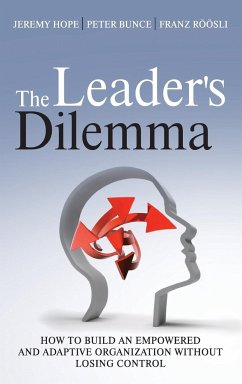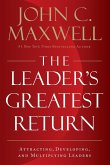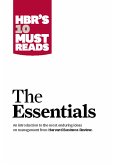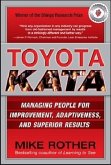Jeremy Hope, Peter Bunce (Beyond Budgeting Partnership LLP), Franz Roosli (Director Beyond Budgeting)
The Leader's Dilemma
Versandkostenfrei innerhalb Deutschlands
37,99 €
inkl. MwSt.
Versandkostenfrei*
Liefertermin unbestimmt
Melden Sie sich
hier
hier
für den Produktalarm an, um über die Verfügbarkeit des Produkts informiert zu werden.
oder sofort lesen als eBook

19 °P sammeln
Jeremy Hope, Peter Bunce (Beyond Budgeting Partnership LLP), Franz Roosli (Director Beyond Budgeting)
The Leader's Dilemma
- Gebundenes Buch
Many leaders realize that in economy it will no longer be the smart highly paid people in the corporate center that drive success. This book is about rethinking how we manage organizations in a post-industrial, post credit crunch world where innovative management models represent the only remaining source of sustainable competitive advantage.
Andere Kunden interessierten sich auch für
![The Leader's Greatest Return The Leader's Greatest Return]() John C. MaxwellThe Leader's Greatest Return21,99 €
John C. MaxwellThe Leader's Greatest Return21,99 €![Hbr's 10 Must Reads: The Essentials Hbr's 10 Must Reads: The Essentials]() Harvard Business ReviewHbr's 10 Must Reads: The Essentials22,99 €
Harvard Business ReviewHbr's 10 Must Reads: The Essentials22,99 €![The Innovation Secrets of Steve Jobs: Insanely Different Principles for Breakthrough Success The Innovation Secrets of Steve Jobs: Insanely Different Principles for Breakthrough Success]() Carmine GalloThe Innovation Secrets of Steve Jobs: Insanely Different Principles for Breakthrough Success21,99 €
Carmine GalloThe Innovation Secrets of Steve Jobs: Insanely Different Principles for Breakthrough Success21,99 €![The Toyota Way Fieldbook The Toyota Way Fieldbook]() Jeffrey LikerThe Toyota Way Fieldbook34,99 €
Jeffrey LikerThe Toyota Way Fieldbook34,99 €![Toyota Kata: Managing People for Improvement, Adaptiveness and Superior Results Toyota Kata: Managing People for Improvement, Adaptiveness and Superior Results]() Mike RotherToyota Kata: Managing People for Improvement, Adaptiveness and Superior Results34,99 €
Mike RotherToyota Kata: Managing People for Improvement, Adaptiveness and Superior Results34,99 €![Boards That Lead Boards That Lead]() Ram CharanBoards That Lead33,99 €
Ram CharanBoards That Lead33,99 €![Leading with Gratitude Leading with Gratitude]() Adrian GostickLeading with Gratitude28,99 €
Adrian GostickLeading with Gratitude28,99 €-
-
-
Many leaders realize that in economy it will no longer be the smart highly paid people in the corporate center that drive success. This book is about rethinking how we manage organizations in a post-industrial, post credit crunch world where innovative management models represent the only remaining source of sustainable competitive advantage.
Hinweis: Dieser Artikel kann nur an eine deutsche Lieferadresse ausgeliefert werden.
Hinweis: Dieser Artikel kann nur an eine deutsche Lieferadresse ausgeliefert werden.
Produktdetails
- Produktdetails
- Verlag: Jossey-Bass / Wiley & Sons
- Artikelnr. des Verlages: 1W119970000
- 1. Auflage
- Seitenzahl: 352
- Erscheinungstermin: 23. Mai 2011
- Englisch
- Abmessung: 235mm x 157mm x 23mm
- Gewicht: 646g
- ISBN-13: 9781119970002
- ISBN-10: 1119970008
- Artikelnr.: 33315268
- Herstellerkennzeichnung
- Libri GmbH
- Europaallee 1
- 36244 Bad Hersfeld
- gpsr@libri.de
- Verlag: Jossey-Bass / Wiley & Sons
- Artikelnr. des Verlages: 1W119970000
- 1. Auflage
- Seitenzahl: 352
- Erscheinungstermin: 23. Mai 2011
- Englisch
- Abmessung: 235mm x 157mm x 23mm
- Gewicht: 646g
- ISBN-13: 9781119970002
- ISBN-10: 1119970008
- Artikelnr.: 33315268
- Herstellerkennzeichnung
- Libri GmbH
- Europaallee 1
- 36244 Bad Hersfeld
- gpsr@libri.de
Jeremy Hope is co-founder of the Beyond Budgeting Round Table, a not-for-profit collaborative dedicated to helping organizations improve their management models. He is a chartered accountant and a co-author of Transforming the Bottom Line, Competing in the Third Wave and Beyond Budgeting. He is also author of Reinventing the CFO. He lives in West Yorkshire, England and can be contacted at jeremyhope@bbrt.org. Peter Bunce is a co-founder of the Beyond Budgeting Round Table (BBRT), a not-for-profit collaborative dedicated to helping organizations improve their management models. He is a Chartered Engineer and has held various posts in manufacturing engineering and collaborative research. He lives in Hampshire, England and can be contacted at peterbunce@bbrt.org. Franz Röösli is a professor and management trainer at the University of Applied Sciences North Western Switzerland (FHNW) and Director of the Beyond Budgeting Round Table (BBRT), an international shared learning network for management development. He has experienced many years in management positions in different industries. He lives in Switzerland and can be contacted at franz.roeoesli@bbrt.org.
Foreword.
Preface.
Some definitions.
Introduction.
The organization as an adaptive system.
1 Principle #1 - Values.
Bind people to a common cause, not a central plan.
2 Principle #2 - Governance.
Govern through shared values and sound judgment, not detailed rules and regulations.
3 Principle #3 - Transparency.
Make information open and transparent; don't restrict and control it.
4 Principle #4 - Teams.
Organize around a seamless network of accountable teams, not centralized functions.
5 Principle #5 - Trust.
Trust teams to regulate and improve their performance; don't micro-manage them.
6 Principle #6 - Accountability.
Base accountability on holistic criteria and peer reviews, not on hierarchical relationships.
7 Principle #7 - Goals.
Set ambitious medium-term goals, not short-term fixed targets.
8 Principle #8 - Rewards.
Base rewards on relative performance, not fixed targets.
9 Principle #9 - Planning.
Make planning a continuous and inclusive process, not a top-down annual event.
10 Principle #10 - Coordination.
Coordinate interactions dynamically, not through annual budgets.
11 Principle #11 - Resources.
Make resources available just-in-time, not just-in-case.
12 Principle #12 - Controls.
Base controls on fast, frequent feedback, not on budget variances.
13 Implementation insights.
14 Make management change your legacy.
Notes.
Index.
Preface.
Some definitions.
Introduction.
The organization as an adaptive system.
1 Principle #1 - Values.
Bind people to a common cause, not a central plan.
2 Principle #2 - Governance.
Govern through shared values and sound judgment, not detailed rules and regulations.
3 Principle #3 - Transparency.
Make information open and transparent; don't restrict and control it.
4 Principle #4 - Teams.
Organize around a seamless network of accountable teams, not centralized functions.
5 Principle #5 - Trust.
Trust teams to regulate and improve their performance; don't micro-manage them.
6 Principle #6 - Accountability.
Base accountability on holistic criteria and peer reviews, not on hierarchical relationships.
7 Principle #7 - Goals.
Set ambitious medium-term goals, not short-term fixed targets.
8 Principle #8 - Rewards.
Base rewards on relative performance, not fixed targets.
9 Principle #9 - Planning.
Make planning a continuous and inclusive process, not a top-down annual event.
10 Principle #10 - Coordination.
Coordinate interactions dynamically, not through annual budgets.
11 Principle #11 - Resources.
Make resources available just-in-time, not just-in-case.
12 Principle #12 - Controls.
Base controls on fast, frequent feedback, not on budget variances.
13 Implementation insights.
14 Make management change your legacy.
Notes.
Index.
Foreword.
Preface.
Some definitions.
Introduction.
The organization as an adaptive system.
1 Principle #1 - Values.
Bind people to a common cause, not a central plan.
2 Principle #2 - Governance.
Govern through shared values and sound judgment, not detailed rules and regulations.
3 Principle #3 - Transparency.
Make information open and transparent; don't restrict and control it.
4 Principle #4 - Teams.
Organize around a seamless network of accountable teams, not centralized functions.
5 Principle #5 - Trust.
Trust teams to regulate and improve their performance; don't micro-manage them.
6 Principle #6 - Accountability.
Base accountability on holistic criteria and peer reviews, not on hierarchical relationships.
7 Principle #7 - Goals.
Set ambitious medium-term goals, not short-term fixed targets.
8 Principle #8 - Rewards.
Base rewards on relative performance, not fixed targets.
9 Principle #9 - Planning.
Make planning a continuous and inclusive process, not a top-down annual event.
10 Principle #10 - Coordination.
Coordinate interactions dynamically, not through annual budgets.
11 Principle #11 - Resources.
Make resources available just-in-time, not just-in-case.
12 Principle #12 - Controls.
Base controls on fast, frequent feedback, not on budget variances.
13 Implementation insights.
14 Make management change your legacy.
Notes.
Index.
Preface.
Some definitions.
Introduction.
The organization as an adaptive system.
1 Principle #1 - Values.
Bind people to a common cause, not a central plan.
2 Principle #2 - Governance.
Govern through shared values and sound judgment, not detailed rules and regulations.
3 Principle #3 - Transparency.
Make information open and transparent; don't restrict and control it.
4 Principle #4 - Teams.
Organize around a seamless network of accountable teams, not centralized functions.
5 Principle #5 - Trust.
Trust teams to regulate and improve their performance; don't micro-manage them.
6 Principle #6 - Accountability.
Base accountability on holistic criteria and peer reviews, not on hierarchical relationships.
7 Principle #7 - Goals.
Set ambitious medium-term goals, not short-term fixed targets.
8 Principle #8 - Rewards.
Base rewards on relative performance, not fixed targets.
9 Principle #9 - Planning.
Make planning a continuous and inclusive process, not a top-down annual event.
10 Principle #10 - Coordination.
Coordinate interactions dynamically, not through annual budgets.
11 Principle #11 - Resources.
Make resources available just-in-time, not just-in-case.
12 Principle #12 - Controls.
Base controls on fast, frequent feedback, not on budget variances.
13 Implementation insights.
14 Make management change your legacy.
Notes.
Index.







